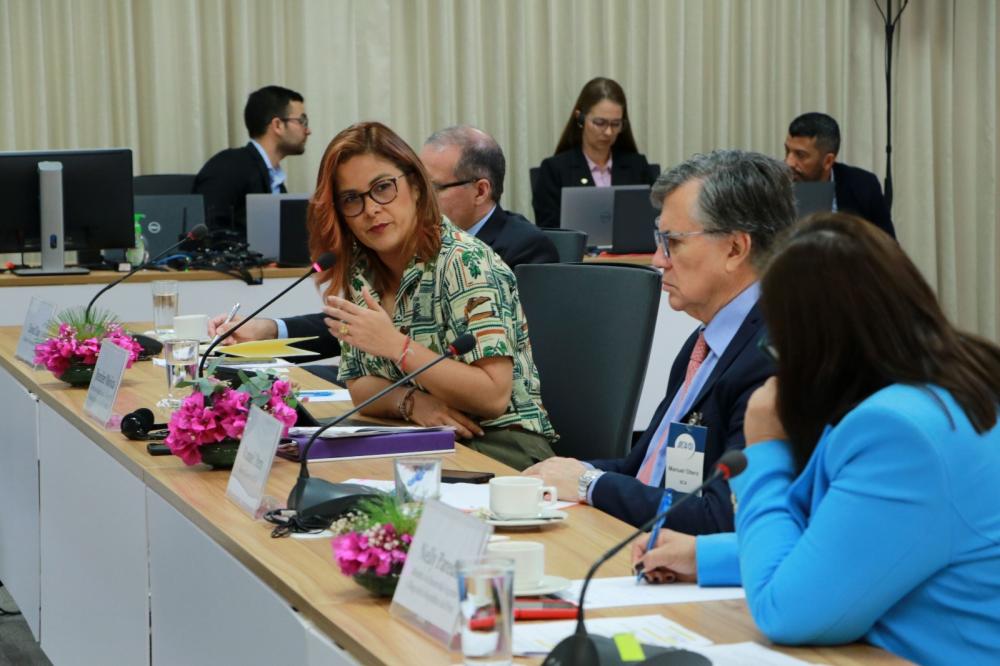Colombia making progress with recognition of care work to improve the lot of rural women, affirms minister of agriculture at IICA forum

San José, August 22, 2023 (IICA). Colombia’s Minister of Agriculture and Rural Development, Jhenifer Mojica, says that, despite the harsh realities, her country is making significant progress in improving the lot of rural women through recognition of care work as a productive activity, and of the true value of the contribution that rural women make, with a view to formulating public policies tailored to the needs of these key players, who are the bulwarks of their communities’ food security.
The official, one of the three women ministers of agriculture in the countries of the Americas, took part with her colleagues Nelly Paredes del Castillo, Peru’s Minister of Agrarian Development and Irrigation, and Laura Suazo, Honduras’ Secretary of Agriculture and Livestock, in the IV Forum of Female Ministers, Deputy Ministers and Senior Officials of the Americas organized by the Inter-American Institute for Cooperation on Agriculture (IICA).
“Despite many factors of inequality, rural women embody resilience, and we mustn’t fall into the trap of feminizing care or losing sight of their tireless efforts and contribution to agrifood chains, their vital role in the preservation of cultural traditions, agricultural practices, gastronomy, and the social fabric of their communities, which reflects that enormous capacity and structurally important contribution to the growth of rural communities and to development,” Mojica said.
The forum was held at IICA Headquarters in San José, Costa Rica, with deputy ministers, senior representatives from Canada, the United States, Brazil and St. Vincent and the Grenadines, and international cooperation and funding agencies taking part. Other participants included the Secretary General of CARICOM, Carla Barnett, the Director General of IICA, Manuel Otero, and rural leaders from every region of the Americas.
The Colombian official also highlighted “the creativity of women ¾their ability to find innovative solutions to everyday problems and to manage poverty¾, and their determination to maintain cultural practices and fight for a healthy future for future generations, all of which makes them vital human capital.”
She then explained that “in our role as developers of public policies it is essential that we women are in a position to make decisions. The voice of women and the role women play on the boards of development banks are essential.”
The highest-level agricultural authorities in the Americas established the forum as a permanent body in 2021. The idea was to create a space for reflection at the highest level aimed at raising awareness of the participation of rural women, and proposing gender-inclusive policies that reduce gender gaps and inequalities and foster participation and inclusion in rural development on equal terms.
Mojica pointed out that in Colombia four out of ten rural women suffer from structural poverty and extreme poverty, and half of Colombian households headed by women experience food insecurity.
In addition, women’s unpaid care workload is eight hours a day, three times the figure for men, while the rural unemployment rate for women is also three times higher than the figure for men, and women’s monthly income is only 66% of men’s income. The minister also stressed that only 26% of the agricultural units that produce food are headed by women, among other unfavorable indicators.
Given the disadvantages that women face in relation to land ownership, access to credit, technology and machinery, since the 1990s Colombia has been working to generate programs and policies designed to correct the imbalances, the minister added.
She then said that “in Colombia we are faced with a very big challenge. Since 2002, there has been a policy in place for rural women specifically designed to coordinate the entire state system with a view to creating better conditions for women to participate in decision-making. It is also geared to the generation of spaces, specific quotas for women on the boards of entities associated with all aspects of rural agricultural development, as well as affirmative policies that foster more investment in services for women and in meeting their needs related to their productive role, with all the factors that have to do with the development of agriculture.”
“Regulations have also been introduced (...) that recognize the care economy in Colombia. This is a very important indicator because it enables us to produce data related to the use of rural women’s time in the care economy, and then take policy decisions. Thus we are making progress with the generation of data for decision-making,” she added.
Mojica also pointed out that women and organizations of peasant, black and indigenous women victims have been recognized in implementing the peace agreement in Colombia, with care regarded as a valuable economic activity that also makes it possible for women to obtain title to land and access credit and other development resources.
She emphasized that Colombia is currently endeavoring to establish exactly how much the care economy contributes to the economy as a whole.
“Seventy per cent of food is produced by peasant women, and by women working in their own backyard vegetable gardens, using their own productive capacities close to home. Our goal is to quantify how much this contributes to our rural GDP and how much we need to invest to improve the conditions for development. And this government is already using participatory bodies to update policies in a concerted, diverse process with differentiated approaches, with territorial and regional approaches, because we have many situations that make it possible to adopt public investments tailored to the needs of each woman,” she concluded.
More information:
Institutional Communication Division.
comunicacion.institucional@iica.int